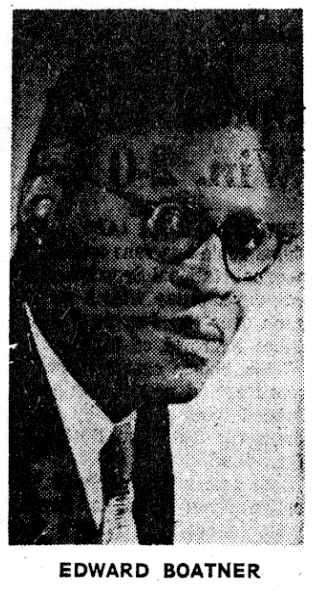

“There has been no greater influence on the world of Black Choral music than Edward Boatner ”
- MAX ROACH
(world class drummer and jazz composer)
Edward Boatner was born in New Orleans in 1898 and made music and religion his life until he died in 1981. His father, Dr. Daniel Webster Boatner, was a former slave who became an itinerant minister. Edward Boatner was exposed at an early age to the music sung by African-Americans in the churches where his father preached. He was particularly fascinated by the spirituals of the former slaves and began collecting them. He was encouraged by the famous tenor Roland Hayes, to continue his music studies. He received his musical education at Western University (Kansas), Boston Conservatory of Music and graduated from the Chicago College of Music. Prof. Boatner operated his music studio in New York City where he instructed piano, voice and opera in German, Italian and French. He was a nationally known music educator and a few of the famous people he coached were opera singer George Shirley, actor Clifton Webb, entertainer Josephine Baker and blues songstress Libby Holman.
A deeply religious man with a life-long interest in spiritual music, Prof. Boatner published his first spiritual arrangement, “Give Me Jesus,” in 1918. Boatner was a prolific writer of textbooks on music, theory and pedagogy; non-fiction–especially on racial issues; short stories and the novel, “One Drop of Blood.” He was credited with approximately 300 works of African-American spirituals for choir and vocal soloist. His works have been performed and recorded by such great artists as Roland Hayes, Marian Anderson, Nelson Eddy, Paul Robeson and Leontyne Price. Prof. Boatner is considered along with the late Hall Johnson to have been one of the leading authorities on spiritual music.
Prof. Boatner organized and conducted singing groups of all sizes. He was the conductor from 1926 to 1930, of the thousand-voice choir at the Baptist National Convention; and the production of his own “Freedom Suite” in Constitution Hall in Washington, DC.
Boatner founded the Art of Black Music Foun- dation an organization dedicated to raising scholarship funds for talented underprivileged youngsters and to the preservation of African- American music. A free school of music for the poor had been his dream. He received many honors, from organizations such as the National Federation of Music Clubs and the National Association of Negro Musicians.
Prof. Boatner was the father of the late jazz saxophonist Sonny Stitt, the late Adelaide Boatner, a singer, and the late Clifford Boatner, a high school teacher. Daughter Sarah Boatner Alias, a vocalist, lives and works in New York City.
Now the spiritual is enjoying a renaissance. Boatner wrote about the history of spirituals, “For many years after emancipation, blacks turned their backs on the slave-created spirituals. Perhaps it was too bitter reminder of the past. Today there is more acceptance of this past heritage. We should not forget that ragtime, jazz, blues, swing, rock and roll and gospel all have stemmed from the spiritual.”
Boatner was a leading exponent of the spiritual as a part of a personal religious experience and an evangelizing tool. A deep interest and belief in the Bible inspired Prof. Boatner to create the religious musical, The Man from Nazareth.